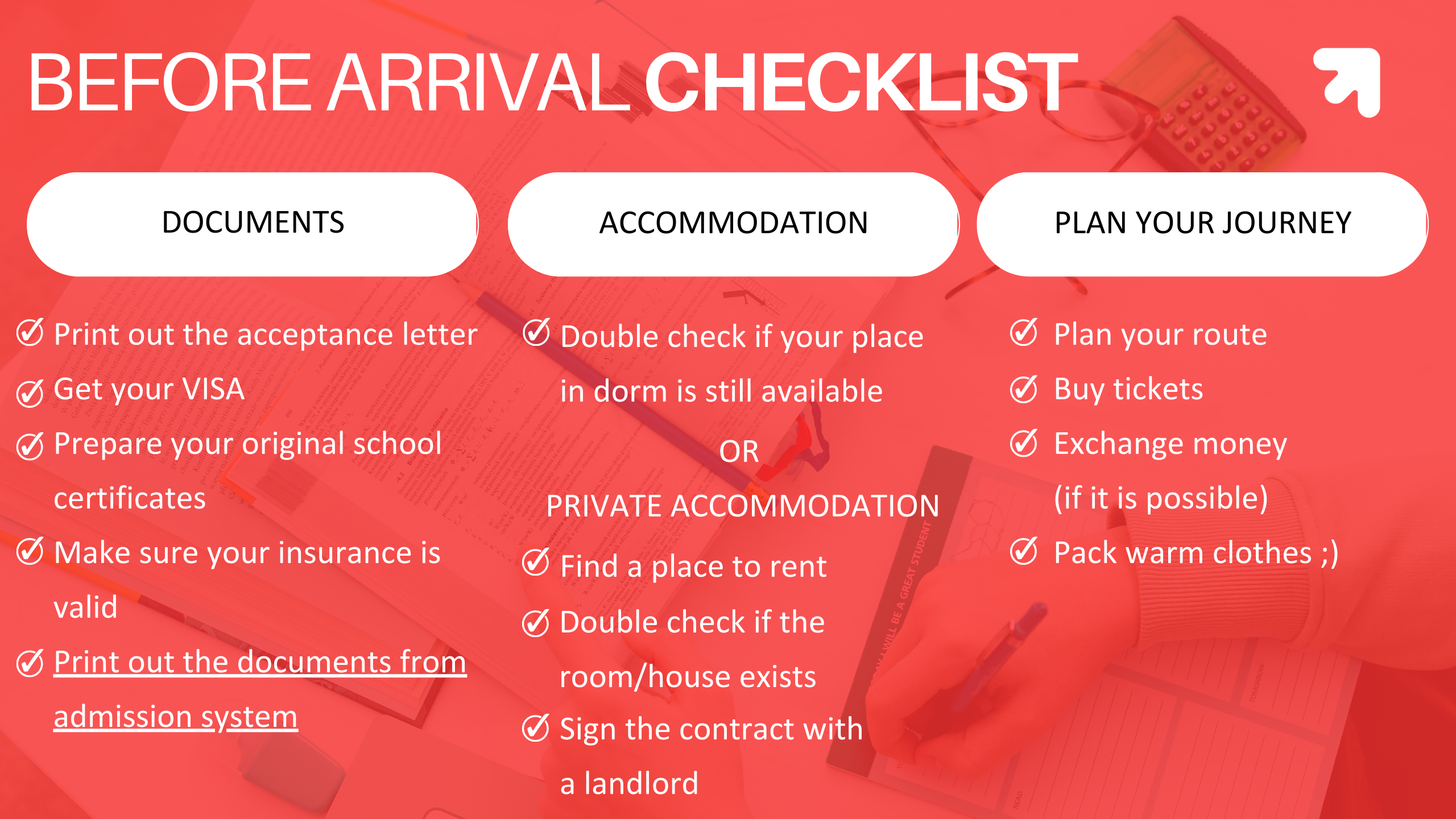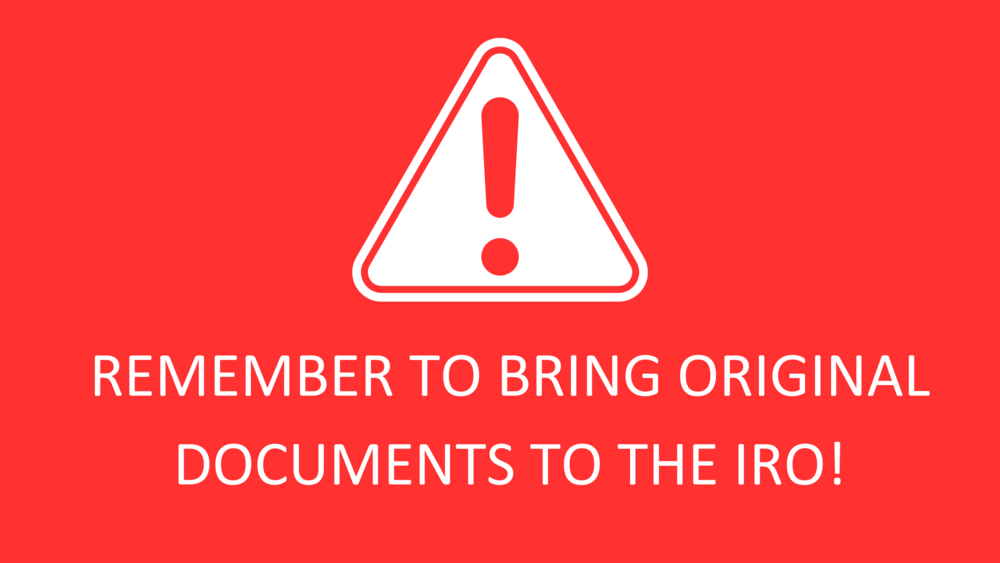NO LATE ARRIVALS

If you cannot come to UL by 3rd October, please make sure you have a consent to come a few days later in the admission message box.
No latecomers will be accepted after the date given in the admission system by the Admission Officer.
There are NO online classes, all classes happen in face-to-face mode so your presence is required from the beginning of the studies.
Every candidate has to immediately inform the University Lodz about the visa decision and date of arrival in Lodz. It is suggested to arrive to Lodz a week before the beginning of the academic year to participate in welcome events and in order to arrange the stay in Lodz.

Before leaving your home country you should have with you:
An original of the secondary education certificate, and/or the Bachelor’s degree certificate, stamped with an Apostille or legalized in a Polish Embassy in its country of origin (documents without the Apostille or legalization will not be accepted by the UL and you will not be able to start studying).
An original of the eligibility statement saying that their certificate/diploma gives the right to study at the university level or continue education on Master’s level in the country it was issued stamped by the Higher Education Authorities or legalized by the Polish Embassy if applicable
Printed Application Form and other statements sent to you by UL.
Valid passport including student visa.
A proof of health insurance valid for basic medical care in Poland (check the emergency phone number).
Printed Acceptance Letter that you have been accepted as a student of UL, as it might be needed at the airport.
Confirmation of accommodation (printed email that you are granted a place in the dormitory or a letter from a private dormitory or a flat).
Talk to your bank about how your card is going to work abroad or set up a new account if needed. There are also accounts for international students offered in Polish banks, so it’s an option to consider.
Please make sure to personally visit IRO with all ORIGINAL documents between 15th September to 3rd October the latest, Monday to Friday, from 8 am. to 1 pm. and from 1:30 pm. to 3 pm. Address: 3 Uniwersytecka Street (room: 1, ground floor) [google maps link]. Do not go to the Faculty before visiting IRO – your documents are at IRO till everything is finalized.
If you have questions, please ask them in admission system message box, not by email. Please do not write to other departments’ personnel of the University of Lodz, only Admission Officers in the admission system are responsible for your recruitment to the UL.
There are two possible aiports that you can arrive at.
CHOPIN AIRPORT
www.lotnisko-chopina.pl/en/index.html
MODLIN AIRPORT
https://en.modlinairport.pl/
Recommended route
Bus line nr. 175
OR ► WARSAW CENTRAL STATION
train S2
From Warsaw Central Station take train to Lodz.
Below you can check departures to plan your further journey.
https://rozklad-pkp.pl/en
The best option would be to use Flixbus which the most popular bus company in Poland.
You can get directly from Modlin to Lodz thanks to their buses.
Below you can find more information:
https://www.flixbus.co.uk/
With a taxi, you need to call the taxi company or find a taxi rank.
You can find a taxi rank easily on each airport.
There is a chance to order a taxi through apps, here are some examples:
iTaxi
itaxi – Aplikacje na Androida w Google Play
Freenow
free now – Aplikacje na Androida w Google Play
Uber
Uber - Zamów przejazd – Aplikacje w Google Play
You can get apps which search the most convenient routes between/within Polish cities. You might use Google Maps or the Jakdojade app for iOS or Android. It works in English or Polish depending on your phone language settings. Its full functionality requires location and web connection. With the app, you can purchase tickets, after you specify your credit card or other method of payment. This way, you don’t need to buy paper tickets: the app validates your fares and counts time.
Remember to buy right tickets: Warsaw city transport (incl. trams, buses, and city rail) use unified tickets. The tickets shown below work both with city rail and city buses. You need to validate them when you enter the vehicle. Remember: you have to buy regular price tickets; the student discount is valid only with polish university students ID card!
With the online apps, you can purchase tickets as well. The apps validates your fares and counts time.
An exchange office is called a KANTOR. It is not recommended to exchange money at the airport or train/bus station, because the rate may be higher than anywhere in the city. Except for emergencies, maybe wait with exchanging your money until you get to Warsaw Central or Łódź. Also, please know that in Poland it is widely accepted to pay with credit/debit card or with other methods or contactless payment (e.g. NFC payments with your phone or watch).
PLEASE KNOW THAT THE ONLY OFFICIAL LANGUAGE IN POLAND IS POLISH
You may find English versions of leaflets, websites, and sightseeing posters – but not always. You will see Polish versions of all place-names (Łódź – but perhaps no more Lodz).
The list of useful words and sentences in Polish:
“The place is cool, but not cool enough for polar bears” 😉
Usually, the coldest month in Lodz is January (-2,5°C monthly average, but -15°C is not rare), and the warmest July (+18°C monthly average, but +30°C at times).
An average Winter provides splendid weather for skiing in the mountains, and an average Summer is a mix of heat waves and showers. October, when all courses start, may generally require a light coat and a pocket umbrella.
Mobile phones and SIM cards: pre-paid services are very popular, but make sure your phone has no network lock. Before making your first call, register your number – fill out the form and show your ID or passport at the network store or its partner point (i.e. Żabka, Ruch, Poczta Polska – check full list at the specific network’s website).
As a parent, you probably have many questions and doubts about your child's studies. Please read carefully the topics below to know more.
Under the 2018 General Data Protection Regulation, University staff cannot release any information about prospective, current or existing student to a third party, including parents/legal guardians, without that student’s permission, unless student is under the age of 18 years old. In accordance with Polish civil code, a student is considered as an adult from the day when 18 years old age is obtained. The UL does not have a document authorization that students can sign in order to give families access to their records.
The privacy protection GDPR gives to candidates or students is very broad. With limited exceptions, the GDPR regulations give privacy protection to all students’ “education records.” Education records contains any records with information directly related to candidates or students and which are maintained by the University. Examples of records entitled to GDPR privacy protection are grade reports, transcripts, disciplinary files or even place of stay or phone number.
Under the civil law, the access rights that parents and legal guardians had in the elementary and secondary school setting are transferred to students once a student has turned 18 (eighteen).
In the emergency, University staff might contact the student’s next of kin without their permission if medical personnel advise that it is required or in other case as sensitive or urgent.
If we learn of an emergency involving one of our students, we will attempt to notify the student’s parents in accordance with specific emergency service notification policy and procedures. Police agencies may also maintain separate emergency contact information (through appropriate embassy). Every UL student is requested during first days in Lodz to indicate emergency contact person.
Generally, students are not subject to the University’s control or supervision while off-campus. However, if we learn of an emergency involving a UL student, we will attempt to notify the student’s parents in accordance with our emergency notification policy and procedures. Hospitals and police agencies will also follow their own notification protocols. By law regulations in Poland, medical treatment services are confidential for students 18 and older. These students have a right to consent to release of medical information in the hospital if they are self-consciousness. Parents of minors, however, are entitled to medical information.
If your child is under 18 years old, you can obtain all information about candidates’ or student’s academic-related matters. University staff may ask you for some personal details of candidate or student to verify whether you are allowed to get any information. It is suggested that the contact is made by those members of family who sign declaration of parental/legal guardians consent of an underage person. Please bear in mind, that at the day when your child obtains 18 years old age, you cannot be granted direct information anymore.
Information about a student’s progress during the application process can only be discussed with the student concerned. If your child wishes to discuss their application with us, they must contact us directly. The best way to contact us is sending a DM through admission platform.
If you are worried about your child, the only way to obtain information is staying in a regular contact with him/her directly. While communicating with young adults can be a challenge, the student years are a period of growth and maturation. The willingness of students to share information usually grows, especially as they acquire the confidence that comes with assuming greater responsibility for their own lives. Unfortunately we cannot disclose whether the student attends the University or academic results.
Private accommodation or other places of stay generally are not under the control or supervision of the University. Students living outside campus have greater autonomy than students residing in UL’s dormitories. Like other off-campus housing options, it is under individual lease agreements with students rather than the UL. In UL’s dormitories our facilities officers are requested to inform UL managing staff when a health or safety emergency occurs. If the staff members are aware of students in life threatening situations and parents have not already been contacted UL's personnel, they will make every effort to contact parents at that time. Students may also submit a complaint with the dormitory manager against the students involved in an incident at a dormitory which constitutes a violation of the rules related to student rights and obligations.
Roommate conflicts do happen. They can happen regardless of whether students are complete strangers or have known each other for years. Most students find out that talking over the problems with the roommate resolves the conflict. However, sometimes help is needed. It is counterproductive for parents to get involved in roommate disputes. As a parent, the best way for you to help the situation is to refer a student to the dormitory manager who is experienced to resolve roommate disputes.
The beginning of a student career marks many changes in students and their relationships with family and friends. It can also mean changes in beliefs, values, behaviours, and attitudes. Parents and family members provide a crucial support base for these new experiences. Understanding and adjusting to these changes is an exciting challenge for both students and parents. Parents play a vital role in the lives of students, and many students still count on their parents to remain a steady and stable source of support and guidance. Parents can serve as mentors, offering advice and encouragement, while also promoting the independence, autonomy, and responsibility that are necessary for student life.
From the increased academic workload to the pressures of making new friends to the new amount of unstructured time, students may experience a great deal of stress or anxiety related to their new responsibilities as a university student. You can help your student prepare for these new responsibilities by discussing expectations ahead of time and by allowing your student to practice these skills before arriving to campus. The more comfortable your student feels about managing these responsibilities, the less stressful they will seem in the fall. In particular, the following are some of the experiences that many students feel are big adjustments when they come to campus:
Doing own groceries, meals or laundry
You can help by making sure your child knows how to operate machines, cook basic meals, use healthy products, understand clothing labels and symbols, and separate laundry as needed. Practicing before leaving home is a big help.
Sharing a room
You can help by teaching your student to respect a roommate’s personal space, property, and unique differences. You can teach your student how to communicate in personal relationships, how to set ground-rules with a roommate, and how to ask University staff for help when necessary.
Scheduling own health appointments/managing prescriptions
You can help by allowing your student to make health appointments before coming to college and by installing in your student a sense of personal responsibility for health-related issues. You can also make sure your student knows the health history and has all of the necessary health insurance information prior to arrival to campus. Stress out the importance of enlisting to health centre after arrival in Poland.
Using public transportation
You can help by providing the opportunity for students to practice using public transportation. Make sure that your student knows how to interpret the bus schedules, use transportation app, arrange for air/bus/train transportation. All necessary rules of using local transport in Poland or Lodz city are given to newcomers in a guide sent at the end of August.
Communicating with University staff and faculty
You can help by having your student take responsibility for communication with the University. Students should feel comfortable with seeking assistance from University staff, both administration and academics as well. Students should know which department to call when problems arise. You can help by resisting the urge to "come to the rescue" by contacting the University departments yourself. Instead, encourage your student to contact the University departments directly at the very beginning. By encouraging students to take responsibility for themselves, parents and family members demonstrate confidence in their students. This confidence empowers students to be self-reliant and independent.
Living within a budget
You can help by establishing a weekly or monthly budget with your student. Teach your student how to plan for regular expenses (dormitory bills, personal supplies, groceries), as well as unexpected/infrequent expenses (new clothes, health care expenses, replacing broken property, etc.). Make sure they know how to balance a checking/debit account before they come to Lodz. You can help by discussing expectations ahead of time. Should your student use a debit-only system or use a credit card? Teach your student how to accurately compare financial services offers, how to read the “fine print,” and how to act responsibly when it comes to debt management. It might be also helpful by teaching your child how to accurately read billing statements, how to keep organized so that bills are not paid late, and how to resolve problems if bills are inaccurate. Students are responsible for payment by the due date.
General safety
You can help by communicating your expectations about safety, alcohol and other drugs, discussing family values regarding alcohol and drug use, educating your student about Polish national and campus rules. Alcohol is easy accessible in Poland, however student cannot drink in public open spaces or University campus. Please make your student aware that any drugs in Poland are forbidden and may result into imprisonment up to 10 years. You can help by teaching your child ways to keep property safe (such as locking doors, bikes, and laptops), and by teaching your student that personal and property safety are individual responsibilities.
Don’t forget to take care of your child! This is a period of adjustment for you as parent too. Your mixed feelings of joy and sorrow, pride and loss, are normal. There will be a void in the family and some roles may adjust, especially if younger siblings are still at home. It’s a good time to refocus on your own hobbies and interests. And remember that your student still needs you and loves you (even if you hear it only from time to time)!
They are adjusting to new roommates, relationships, freedom, and responsibilities. The first six weeks are a challenging time trying to make these adjustments all at once. They are excited about moving away from home, but may also be homesick. They are enthusiastic about starting life at UL, but may be insecure about fitting in, being as smart as everyone else, or navigating unfamiliar surroundings. They’re unsure of what to expect academically – the unknown workload and expectations from their faculty.
They may have trouble managing time in a less structured college learning environment. They’re starting to get a sense of UL's academic expectations. Freshmen may discover that what worked for them in high school may not work in college, and that a whole new level or work is expected. New students may experience feelings of inadequacy, and they may ask themselves: “Can I really make it here?”
After Christmas, there is very little time until final exams. Term papers and projects are due, and students may be unaccustomed to the amount of research and effort required for lengthy papers. Students may get very little sleep, and neglect good nutrition and exercise. They'll be stressed about final exams. They will receive their grades from winter semester and will either feel disappointed or delighted. Whether the grades are good or bad, they will have a better understanding of what UL academic work requires.
Set realistic expectations for your student regarding academics, financial responsibility and social life. Discuss these expectations with your student in a non-judgmental manner, and be open to listening as well. Keep the lines of communication open. Encourage your child to be independent and responsible. Be an empathic listener but refrain from becoming a rescuer when there is a problem. Demonstrate trust in your student. Encourage your student to engage with the academic community and university events. Listen and provide reassurance. Remind your student that these adjustments and feelings are normal.
Be prepared for the phone call late at night. Students need to vent frustrations or fears, and you will be the listening ear. In most cases, the student will feel much better after having vented to you, but you may feel terrible and worried. Celebrate your student’s successes and help keep disappointments in perspective (e.g., not becoming best friends with a roommate or not getting a best grade on their first exam). Keep lines of communication open on an adult-to-adult level, and avoid being judgmental.
Recognize that examination session is a very stressful time of year for your child. Encourage healthy habits to help reduce the stress of exam time. Healthy habits will also help your student to prevent illness. Minimize family expectations. Your student will be very stressed in January. While you won’t be able to prevent the academic stress, you can reduce the pressure for your student to participate in family life, which put added demand on a student’s busy schedule.





